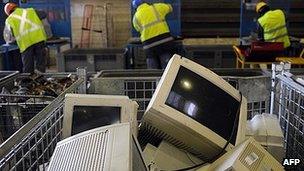Electronic waste: EU adopts new WEEE law
- Published

Recycling ensures that toxic metals in e-waste are extracted safely
The European Parliament has passed a new law to curb dumping of electronic goods such as mobile phones, computers and TV sets in landfill sites.
From 2016 EU member states will have to collect 45 tonnes of e-waste for every 100 tonnes of electronic goods put on sale during the previous three years.
By 2019 the target must rise to 65 tonnes, or member states can opt to collect 85% of total e-waste generated.
EU officials say only about one-third of e-waste is treated appropriately.
The European Commission - the EU's executive branch - says the existing binding EU collection target is 4kg (8.8 pounds) of e-waste per person - that is about 2m tonnes per year, out of around 10m tonnes generated annually in the EU.
The new law, external, an update of the 2003 Waste Electrical and Electronic Equipment (WEEE) Directive, gives 10 EU states until 2021 to reach the new targets, so that they can improve their waste disposal facilities.
The 10 are the states, mostly in the former communist bloc, which joined the EU in 2004 and 2007.
Encouraging recycling
The new law will oblige large shops selling electrical goods to accept small e-waste items from customers, such as mobile phones, even if the customers do not buy a replacement.
With big items such as washing machines, the manufacturers will be responsible for the recycling.
The new directive, expected to be formally approved by the 27 EU governments soon, should become law in 2014.
It also requires exporters to provide proper documentation for goods being shipped for repair or re-use.
The aim is to prevent illegal shipments of e-waste to poorly equipped developing countries, where workers are sometimes exposed to health hazards.
Such illegal shipments, used to evade EU regulations, are a serious problem in the EU, the Commission says.
- Published4 August 2010